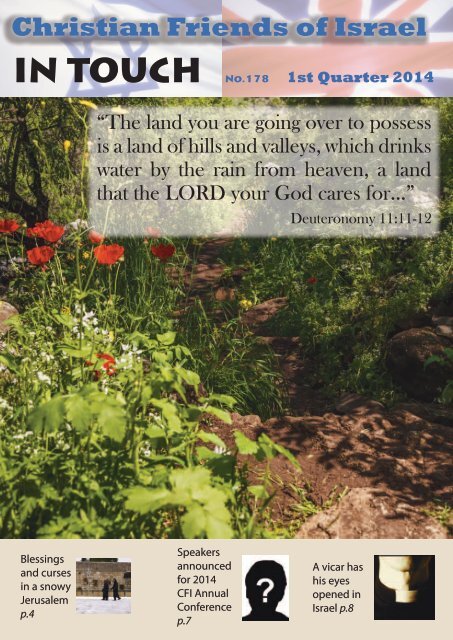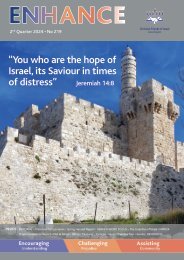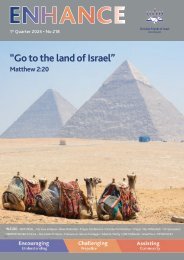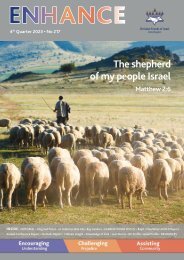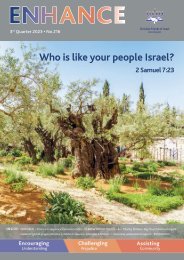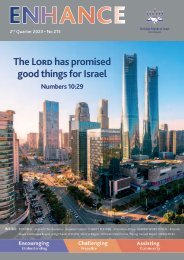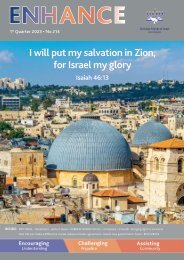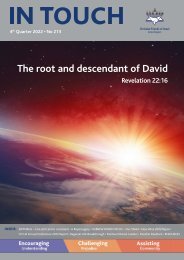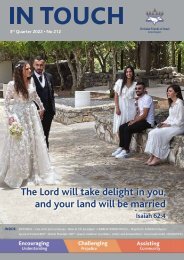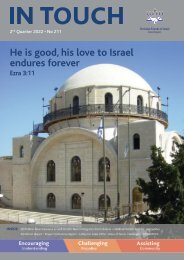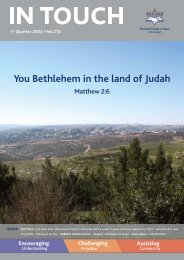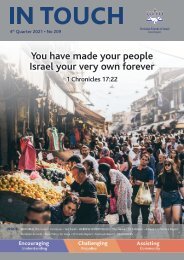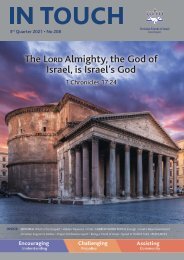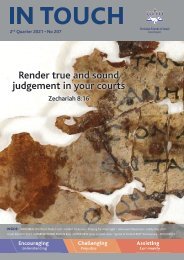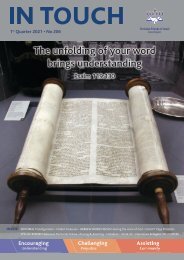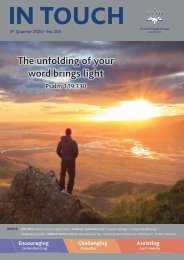In Touch Quarter 1 - 2014
You also want an ePaper? Increase the reach of your titles
YUMPU automatically turns print PDFs into web optimized ePapers that Google loves.
Christian Friends of Israel<br />
IN TOUCH No.178 1st <strong>Quarter</strong> <strong>2014</strong><br />
“The land you are going over to possess<br />
is a land of hills and valleys, which drinks<br />
water by the rain from heaven, a land<br />
that the LORD your God cares for...”<br />
Deuteronomy 11:11-12<br />
Blessings<br />
and curses<br />
in a snowy<br />
Jerusalem<br />
p.4<br />
Speakers<br />
announced<br />
for <strong>2014</strong><br />
CFI Annual<br />
Conference<br />
p.7<br />
A vicar has<br />
his eyes<br />
opened in<br />
Israel p.8
THE CHURCH AND<br />
THE PROMISED<br />
LAND (Part 2)<br />
<strong>In</strong> <strong>Touch</strong><br />
is the quarterly magazine of<br />
Christian Friends<br />
of Israel UK<br />
CFI-UK seeks to bless Israel by<br />
means of practical and moral<br />
support, and to serve the Church in<br />
teaching about God’s purposes for<br />
Israel and the Hebraic roots<br />
of our faith.<br />
CFI also produces a monthly News<br />
Report, a monthly Prayer Letter and<br />
a Middle East Update CD/MP3.<br />
Please send for full details of the<br />
practical projects and also of the<br />
many teaching resources available.<br />
As an educational charity,<br />
we carry a variety of<br />
resources relevant to our<br />
purpose. We do not<br />
necessarily endorse every<br />
view expressed by our<br />
guest writers or authors<br />
of these resources.<br />
CFI Communications<br />
PO Box 2687<br />
Eastbourne<br />
BN22 7LZ<br />
Tel: 01323 410810<br />
Fax: 01323 410211<br />
Email: info@cfi.org.uk<br />
Websites: www.cfi.org.uk<br />
www.keshercourse.org.uk<br />
Published by:<br />
CFI Charitable Trust<br />
UK Registered Charity<br />
No. 1101899<br />
Registered Office: c/o<br />
Caladine, Chantry House<br />
22 Upperton Road<br />
Eastbourne, BN21 1BF<br />
Company No. 04984515<br />
VAT Registration No:<br />
678-7802-75<br />
Front Cover Image:<br />
Yehudiya Nature Reserve<br />
Copyright © Reinhold Mainse<br />
DesignPics.com<br />
Page 8 Image © Felipe Rodrigues<br />
Jacob Vince unpacks the New Testament Apostles’<br />
teaching on the land of Israel.<br />
<strong>In</strong> my last<br />
editorial I<br />
countered the<br />
claim that there<br />
is little said about<br />
the land of Israel<br />
in the section of<br />
the Bible referred<br />
to as the New Testament, by<br />
looking at Stephen’s Speech - the<br />
Sanhedrin (Acts 7:1-53) and Paul’s<br />
Proclamation - Pisidian Antioch<br />
(Acts 13:13-43), having previously<br />
considered in an earlier edition<br />
Luke’s Logistics - Jesus and<br />
Apostles (Luke 24:13-49 and Acts<br />
1:1-11).<br />
Hebrews’ Heroes - Faith in Action<br />
(Hebrews 11:1-40)<br />
There is another passage, as far<br />
as the early Church is concerned,<br />
that also looks at the matter of<br />
the ‘Promised Land’ in similar<br />
detail. It is found in the letter<br />
understood to have been written<br />
to the Hebrews.<br />
It concerns the exercise of<br />
faith by what are called ‘a great<br />
cloud of witnesses’ (Hebrews 12:1).<br />
Whilst faith is the primary focus<br />
or metanarrative of the passage<br />
it does nonetheless provide an<br />
insight into the writer’s thinking<br />
with regard to the land of Israel,<br />
in the sub-narrative, and actually<br />
uses the term the promised land.<br />
‘By faith Abraham, when called to<br />
go to a place he would later receive as<br />
his inheritance, obeyed and went, even<br />
though he did not know where he was<br />
going. By faith he made his home in<br />
the promised land like a stranger in a<br />
foreign country; he lived in tents as<br />
Isaac and Jacob, who were heirs of the<br />
same promise’ (Hebrews 11:8-9). The<br />
passage goes on rightly to indicate<br />
that Abraham was quite properly<br />
looking forward to a city with<br />
foundations, whose architect and<br />
builder is God (Hebrews 11:10). This<br />
is the metanarrative. However the<br />
sub-narrative remains and follows<br />
through in the next portions of the<br />
passage. First of all it indicates<br />
that there is a land promised to<br />
Abraham and specifically through<br />
the family line of his descendants<br />
Isaac and Jacob, not Ishmael or<br />
Esau. It also describes the status of<br />
these defined descendants as like a<br />
stranger, with the implication that<br />
their actual status was not that of<br />
a stranger, but rather of those to<br />
whom the promise of the land had<br />
indeed been given. <strong>In</strong> exercising<br />
faith toward the promise being<br />
outworked and thereby indicating<br />
the physicality of the promise,<br />
Abraham beyond all natural<br />
possibilities, ‘was enabled to become<br />
a father because he considered him<br />
faithful who had made the promise’<br />
(Hebrews 11:11).<br />
The passage then describes<br />
Abraham’s numerous descendants<br />
who exercised faith but did not<br />
receive the things promised<br />
(Hebrews 11:13). The metanarrative<br />
and sub-narrative continue with<br />
further details of the exercise of<br />
faith by Isaac, Jacob, and Joseph,<br />
the latter of whose faith was shown<br />
2 // IN TOUCH
through his belief in the eventual<br />
exodus of the Israelites from Egypt<br />
and by giving instructions about<br />
his bones to be carried to and buried<br />
in the Promised Land (Hebrews<br />
11:22). This can be referenced back<br />
to the earlier Biblical record which<br />
writes specifically about ‘the land<br />
promised on oath’ to Joseph’s father,<br />
grandfather and great-grandfather<br />
‘Abraham, Isaac and Jacob’ (Genesis<br />
50:24-25). The passage in Hebrews<br />
then goes on to recollect the action<br />
taken by Moses in relation to the<br />
land promise (see Exodus 13:19)<br />
and which was further outworked<br />
by the people under Joshua’s<br />
command (see Joshua 24:32). The<br />
faith of Moses is likewise described<br />
in both metanarrative and subnarrative<br />
terms, as is interestingly<br />
the part played by Rahab, who<br />
assisted two scouts from Shittim<br />
who were instructed and sent by<br />
Joshua to spy out the land (see<br />
Joshua 2:1).<br />
As the written account continues<br />
we find other descendants of the<br />
patriarchs coming into the picture<br />
and gaining what was promised,<br />
‘Gideon, Barak, Samson, Jephthah,<br />
David, Samuel and the prophets, who<br />
through faith conquered kingdoms,<br />
administered justice, and gained what<br />
was promised.’ (Hebrews 11:32-33).<br />
The context of what was promised<br />
appears, at least up to this point, to<br />
be the physical promised land.<br />
Now, the main objective of the<br />
narrative is surely to show how<br />
faith is exercised, but this faith is<br />
exercised physically in relation<br />
to believing and acting upon the<br />
promise made by God of a physical<br />
land. The ultimate reward of their<br />
faith was something better and<br />
more lasting than a land or country<br />
in this life but rather that of the<br />
heavenly dimension, as indicated<br />
earlier of Abraham (Hebrews<br />
11:10) and also by later followers<br />
exercising faith (Hebrews 12:22-24).<br />
Nonetheless the pursuit by faith<br />
of the land promise made by God<br />
is most highly commended in the<br />
passage.<br />
The aspect of faith in respect<br />
of the land is further illustrated<br />
through looking in more detail at<br />
the involvement of Rahab, who<br />
in early-church terms would be<br />
described as a Gentile. The record<br />
of her involvement is found in<br />
chapters two and six of the book<br />
of Joshua. Here it is shown that<br />
Rahab recognised God’s giving of<br />
the land, then known as Canaan,<br />
to Israel - the descendants of<br />
Abraham, his son Isaac and his<br />
son Jacob. This is how Rahab’s<br />
own words are recorded, ‘I know<br />
the LORD has given this land to you’<br />
(Joshua 2:9).<br />
<strong>In</strong>terestingly the writer of the<br />
letter to the Hebrews does not<br />
mention Joshua’s name, but only<br />
Rahab’s in connection with this<br />
incident (Hebrews 11:31). More<br />
significantly still, Jesus’ brother<br />
James and head of the first Church<br />
council, in his letter, commends<br />
Rahab’s faith as on a par with that<br />
of Abraham’s. ‘And the scripture<br />
was fulfilled that says, “Abraham<br />
believed God, and it was credited to<br />
him as righteousness,” and he was<br />
called God’s friend. You see that a<br />
person is considered righteous by<br />
what they do and not by faith alone.<br />
<strong>In</strong> the same way, was not even Rahab<br />
the prostitute considered righteous for<br />
what she did when she gave lodging<br />
to the spies and sent them off in a<br />
different direction?’ (James 2:23-<br />
25). And all in the context of God<br />
giving the land to Israel.<br />
COMING SOON!<br />
Over 15 DVD sets of Hebraic/Jewish Roots<br />
teaching series by Revd Desi Maxwell will<br />
be available from CFI-UK from March/April<br />
this year.<br />
Titles include: ‘Heaven On Earth’ – an in-depth<br />
series on The Tabernacle/Tent of Meeting, and<br />
the role of the Great High Priest; ‘<strong>In</strong>sights from<br />
Isaiah’, ‘Dusty Disciples’ – 1 st century insights<br />
from the Jewish rabbis for 21 st century disciples<br />
of Yeshua/Jesus; and ‘Reign Is Forecast’ – a<br />
10-part series looking at the important and little<br />
taught subject of the Kingdom of God.<br />
A full list of titles and pricing will be available<br />
with the next edition of <strong>In</strong> <strong>Touch</strong>.<br />
facebook.com/cfiuk<br />
twitter.com/cfi_uk
BLESSINGS AND CURSES IN A<br />
SNOWY JERUSALEM<br />
Twelve days before Christmas the<br />
heaviest snowstorm to hit Jerusalem<br />
in decades blanketed the City of<br />
the Great King. It continued to fall for<br />
two days, and the northern and western<br />
neighbourhoods of the city, and on the<br />
mountains of Samaria, it was up to two<br />
feet deep.<br />
For me it was reminiscent of my first ever visit to<br />
Jerusalem 40 years ago in January 1974. At that time<br />
Israel was reeling from the shock of the Yom Kippur<br />
War, which had ended just a few weeks earlier. The<br />
tiny nation was in mourning because of the massive<br />
loss of life the IDF had suffered.<br />
There is something almost ethereal about snow<br />
in Jerusalem, which I have experienced a number<br />
of times. The normally bustling, noisy city becomes<br />
still and silent. It is as if the peace of God has<br />
suddenly descended on the ‘City of Shalom’,<br />
which is basically what the name of the Lord’s<br />
declared dwelling place means (Psalm 132:13-14,<br />
Zechariah 8:3). The unfortunate side effect of the<br />
huge snowfall was the complete disruption to all<br />
forms of transport on the mountains of Israel for<br />
several days, as well as masses of fallen trees and<br />
widespread power cuts.<br />
However, many of us who pray for Israel felt there<br />
was something significant about the magnitude<br />
and timing of this particular snowfall, which was<br />
unusually severe and early. During my month-long<br />
visit in December the USA Secretary of State, John<br />
Kerry, visited the Jewish capital three times. His aim<br />
is to force a deal between Israel and the Palestinian<br />
leadership by April <strong>2014</strong>, if possible, which would<br />
see Israel lose most of her Biblical heartland as well<br />
as her ancient capital city where the Temple once<br />
stood. Given the Palestinian oft-stated call for the<br />
By Hugh Kitson<br />
‘destruction of the Zionist entity’, such a deal would<br />
be suicidal for the Jewish State that the Palestinian<br />
leadership doggedly refuses to contemplate<br />
recognising. Those of us who pray often proclaim<br />
Psalm 33:9-11 over the ‘peace process’. Throughout<br />
the 20 years of the so-called Oslo Process the Lord<br />
has so far done just that – brought the counsel of the<br />
nations to nothing! Twelve days before Christmas<br />
it was no different. This time The Lord used the<br />
elements. Kerry landed just before all the main<br />
highways between the coastal plain and Jerusalem<br />
were closed. The snowstorm, accompanied by high<br />
winds, was too intense to use the helicopter, but he<br />
just made it to Jerusalem. The next day his first port<br />
of call was Mahmoud Abbas in Ramallah. On the<br />
outskirts of the town his armour-plated Cadillac –<br />
known as ‘the Beast’ – got stuck in a snowdrift. The<br />
Palestinian police either would not, or could not dig<br />
him out, so the IDF had to come and rescue him – in<br />
Palestinian controlled territory. That was the end of<br />
the meeting with the PA President.<br />
He turned round to keep his appointment with the<br />
Israeli Prime Minister. En route to see Netanyahu<br />
‘the Beast’ skidded off the road and embedded itself<br />
in another snowdrift! The IDF had to rescue him<br />
a second time! He missed that meeting too. The<br />
Secretary of State lambasted his rescuers for ‘Israeli<br />
incompetence’ for not keeping the roads snow-free<br />
– especially the ones he was travelling on – and not<br />
4 // IN TOUCH
eing able to supply electricity everywhere during<br />
such adverse conditions. Moreover he declared that<br />
Israel was little better than a third-world country.<br />
His remarks earned him a stiff rebuke from the IDF<br />
Chief-of-Staff! However, Kerry did eventually get to<br />
meet with Netanyahu and spoke to the PA President<br />
on the telephone. The PA press leaked the contents<br />
of the supposedly confidential discussion saying<br />
that Abbas had found most of Kerry’s proposals<br />
‘unacceptable’. Meanwhile the Israeli press reported<br />
a European Union communiqué that if the peace<br />
process failed Israel would be to blame.<br />
On his return to the USA from his fruitless foray<br />
to create ‘peace’ in the Middle East, Kerry was<br />
greeted by more snowstorms, travel disruption and<br />
widespread power cuts! Was the Lord trying to say<br />
something? Was it the curse of Genesis 12:3, or was<br />
it coincidence?<br />
By Christmas Eve most of the snow that had started<br />
to fall in Jerusalem twelve days earlier had thawed,<br />
but the evidence of the snowstorm was still evident.<br />
Some of the drifts and piles of snow heaped up to<br />
clear the roads had defied the sun’s rays to melt<br />
them away. But life on the mountains of Israel was<br />
more or less back to usual.<br />
<strong>In</strong> Israel Christmas is a normal working day, but<br />
somehow it is different. The hustle and bustle is<br />
not so evident, and one does not get the usual traffic<br />
jams with the<br />
continual honking<br />
of horns. For<br />
some years, my<br />
wife Noreen and<br />
I – together with<br />
others – have been fostering a relationship with a<br />
man and his wife who live on the southern Golan<br />
Heights and manufacture some of the best olive oil<br />
we have tasted. He has often spoken to us about<br />
his fascination for Christmas, which is not one of the<br />
festivals that Jewish people traditionally observe –<br />
this even includes many Messianic Believers. This<br />
Israeli fascination with Christmas is actually quite<br />
widespread. For many years now, Christ Church,<br />
which is situated just inside the Jaffa Gate, has hosted<br />
up to two thousand Israeli visitors over Christmas<br />
Eve and Christmas Day. This year was no exception,<br />
and Noreen and I had the privilege of witnessing it!<br />
The church and courtyard were absolutely packed!<br />
As the midnight Festival of Nine Lessons and Carols<br />
began an awesome hush fell over the packed church.<br />
Christ Church was built within the walls of<br />
Jerusalem in the mid-19 th century, when the vision<br />
for the restoration of the Jewish people to their<br />
Promised Land and to the Lord was reaching its<br />
zenith in the Church in Britain. Christ Church is<br />
unique among Anglican churches across the world.<br />
The London Society for Promoting Christianity<br />
Among the Jews – today known as CMJ – wanted<br />
to create a church where Jewish people who came to<br />
faith in their Messiah did not feel either culturally or<br />
spiritually cut off from the Hebraic Biblical roots of<br />
their faith, or felt compelled to renounce their Jewish<br />
identity as had been required of them through much<br />
of Church history. The first Anglican Bishop of<br />
Jerusalem, Michael Solomon Alexander, the main<br />
visionary behind Christ Church, was himself a<br />
former Jewish Rabbi. A Jewish visitor might think<br />
they were in a synagogue rather than a church!<br />
However, it has always been a place where gentile<br />
believers in the Jewish Messiah are equally welcome<br />
as the stain-glass windows at the front of the church<br />
portray the Apostle Paul’s teaching of ‘wild olive<br />
branches’ being grafted in to the cultured olive tree<br />
in Romans 11:16-21.<br />
As the traditional Anglican Festival of Nine<br />
Lessons and Carols got under way late on Christmas<br />
Eve, the presence of the Holy Spirit in the church<br />
packed with Jewish and Gentile believers in Yeshua/<br />
Jesus, as well as Israeli visitors, was tangible. Of<br />
course, the miraculous <strong>In</strong>carnation and Birth of our<br />
Lord and Saviour Jesus Christ is the central theme<br />
of the traditional Anglican Festival of Nine Lessons<br />
and Carols. However, unseen by the vast majority of<br />
Anglicans who attend their traditional carol service<br />
each year – or even other Christians who participate<br />
– the context of this story that is woven through the<br />
nine lessons is<br />
the fulfilment of<br />
“The Word of God is living and powerful, and<br />
sharper than any two-edged sword, piercing<br />
even to the division of soul and spirit”<br />
God’s covenant<br />
promises to the<br />
nation of Israel,<br />
past, present and<br />
future! One simply cannot divorce Jesus from Israel<br />
– after all He is the King of Israel! So, as each of<br />
the nine Scripture readings, which span both the<br />
Old and New Testaments, progressed in English<br />
(one was read in Arabic), the Scripture text was<br />
displayed in Hebrew on the overhead projector for<br />
the benefit of our Israeli visitors! “The Word of God<br />
is living and powerful, and sharper than any two-edged<br />
sword, piercing even to the division of soul and spirit<br />
…” (Hebrews 4:12). Some of the carols were also<br />
slightly adapted to make them more relevant to our<br />
Israeli visitors. All this, combined with the fact that<br />
Christ Church stands less than a mile from where<br />
the Temple stood, and just a few miles from where<br />
the Saviour was born, made for a carol service that<br />
neither Noreen nor I shall ever forget. Our prayer<br />
is that some of the Jewish folk were touched as we<br />
were. After all, Jesus did say: “And I, when I am lifted<br />
up from the earth, will draw all people to myself” (John<br />
12:32). The Son of God was certainly lifted up before<br />
Israelis in Jerusalem this Christmas time! Praise the<br />
Lord! Could this be a micro-fulfilment of God’s<br />
promise of the blessing in Genesis chapter 12?<br />
facebook.com/cfiuk<br />
twitter.com/cfi_uk
The longer one traverses<br />
this challenging journey<br />
of life on earth, the more<br />
confirmation is to be<br />
found of a somewhat subtle truth<br />
transmitted in the Word of God:<br />
He has hidden certain depths<br />
of holiness, with corresponding<br />
wholeness of being, in a quiet,<br />
secret place where only the humble<br />
of heart and spirit will find it.<br />
To approach and enter that<br />
hidden, set apart place is the<br />
goal and raison d’être of our very<br />
journey for it signifies deeper and<br />
more intimate relationship with<br />
the One who is the Source of our<br />
very being.<br />
The English word<br />
‘humble’ can describe one’s<br />
physical position in life, as<br />
in: “He works at a humble<br />
shoe cleaning job” or “She<br />
lives in a humble cottage in<br />
a poor neighbourhood.” It<br />
can also be used to describe<br />
a person’s character, in<br />
which case his or her<br />
status is not a factor. For<br />
example, “The Director is a<br />
truly humble and generous<br />
person, who always is kind<br />
and considerate of the<br />
employees of the company.”<br />
<strong>In</strong>terestingly, the fruit of being<br />
humble is evidenced in humility;<br />
and the moral and spiritual<br />
characteristics of humility are most<br />
often associated with suffering. A<br />
Jewish maxim declares, “Nothing<br />
is as whole as a broken heart.” We<br />
often see in both historical and<br />
fictional narrative how the outcome<br />
of affliction is humility - a more<br />
radical trust in an unchanging God<br />
and a more total dependence upon<br />
His faithfulness.<br />
Suffering, in all its forms and<br />
with all its tests, is the lesson in life<br />
that slowly rouses us to a deeper<br />
Humble Heirs<br />
awareness and understanding of<br />
our inherent human weakness, on<br />
one hand, and our great potential<br />
of untapped strength on the other.<br />
Our reactions and the choices<br />
made during and after suffering<br />
strikes (and hopefully even before,<br />
as we grow wiser) will display<br />
either humility or the pride of man.<br />
The former will result in quiet<br />
acceptance and a peaceful resolve<br />
based on a powerful trust in the<br />
God in whose hands all things rest.<br />
The latter will disclose a resentful<br />
determination to control the<br />
situation in one’s own strength,<br />
relying on man and employing the<br />
ways of the world rather than the<br />
ways of God’s Kingdom.<br />
The Psalmist sings praise to<br />
Messiah who, in realisation of His<br />
great stature as Heir of Heaven,<br />
champions this trait together with<br />
truth and righteousness. “<strong>In</strong> Your<br />
majesty ride out victoriously for the<br />
cause of truth and meekness [humility]<br />
and righteousness” (Psalm 45:4). We<br />
see a reflection of this picture in the<br />
prophet Zechariah’s description:<br />
“Rejoice greatly, O daughter of Zion!<br />
Shout aloud, O daughter of Jerusalem!<br />
Behold, your king is coming to you;<br />
righteous and having salvation is he,<br />
humble and mounted on a donkey, on<br />
a colt, the foal of a donkey” (Psalm<br />
9:9).<br />
<strong>In</strong> the Scriptures, the Hebrew<br />
word ani’im (~yyn[) describes those<br />
who are suffering some kind of<br />
distress or disability; whether<br />
poverty, pain, sickness, loss or<br />
grief. God’s Word always speaks<br />
in their defence and rules against<br />
any form of oppression or unfair<br />
advantage being taken of a person<br />
in a lowly position or in a weakened<br />
state. A hired servant, for example,<br />
is described as an ani (Deuteronomy<br />
24:14-15). If a master, or<br />
employer, withholds what<br />
is rightfully due or, in any<br />
way, abuses the ani, the<br />
servant needs only to cry out<br />
to God for justice and He will<br />
act as their Defender and<br />
Protector. A king, or leader<br />
of a country, is particularly<br />
charged with overseeing<br />
the poor or weak under his<br />
jurisdiction (Psalm 82:3).<br />
What, then, does God<br />
desire from us, His people?<br />
The prophet Micah tells us,<br />
“…only to do justly, to love mercy<br />
and to walk humbly with your God”<br />
(Micah 6:8).<br />
“To do justly” Justice, together<br />
with righteousness, is the<br />
foundation of God’s Word and is<br />
expressed in our physical actions -<br />
“doing justly.” The basis of justice<br />
is the knowledge that every fellow<br />
human being is worthy of honour<br />
and the right to life as each one is<br />
created in the image and likeness<br />
of God. As we purpose to do<br />
this, it results in a humility that<br />
is expressed in quiet acts of love<br />
to those in our life and to all who<br />
cross our path.<br />
“To love mercy” reflects the<br />
6 // IN TOUCH
heart motivation and the manner<br />
in which we do what we do. A<br />
beautiful aspect of humility is<br />
gentle kindness. Our actions will<br />
be those of grace; a means of<br />
allowing the Lord’s chesed - love<br />
and compassion - to flow to those<br />
in need as we love one another,<br />
clothe the naked, comfort the<br />
mourners, tend to the sick, bury<br />
the dead, etc., etc.<br />
“To walk humbly with our<br />
God” indicates living daily<br />
in His Presence; to constantly<br />
be walking in fellowship and<br />
communion with our Father as<br />
we follow after our Shepherd-<br />
King. Jesus demonstrated how<br />
to live in humility and holiness<br />
as God’s children, doing all in<br />
loving devotion to the will of our<br />
Father. He also taught, “Blessed<br />
are the meek, for they shall inherit<br />
the earth” (Matthew 5:5). Loving<br />
obedience results in earthly and<br />
heavenly inheritance from God.<br />
This exhortation is clearly and<br />
beautifully confirmed in Moses’<br />
declaration to the children of<br />
Israel: “And now, Israel, what does<br />
the Lord your God require of you, but<br />
to fear the Lord your God, to walk in<br />
all His ways, to love Him, to serve<br />
the Lord your God with all your heart<br />
and with all your soul, and to keep the<br />
commandments and statutes of the<br />
Lord, which I am commanding you<br />
today for your good” (Deuteronomy<br />
10:12). His will constantly is for<br />
our good and for our present and<br />
eternal joy.<br />
Throughout the new Gregorian<br />
calendar year of <strong>2014</strong> may we walk<br />
in humility, peace, justice and joy<br />
as royal heirs with Messiah in the<br />
fullness of our Father’s blessing.<br />
Keren Hannah Pryor<br />
(For more insights, with a Hebraic<br />
flavour, see HIS-ISRAEL on Facebook)<br />
<strong>In</strong>troducing the CFI Annual<br />
Conference Speakers for <strong>2014</strong>...<br />
CFI-UK is pleased to announce that the speakers for our<br />
Conference on Saturday 20 th September will be<br />
Simon Ponsonby and Martin Charlesworth<br />
A 4 th generation preacher, Simon Ponsonby<br />
came to a personal living faith in his late teens<br />
through his local Anglican church. Thrilled<br />
by the gospel, he became an evangelist, street<br />
preacher and church planter in his early 20’s,<br />
before preparing for Anglican ordination<br />
at Trinity College Bristol, where he earned<br />
two degrees in theology. From 1995 Simon<br />
served a curacy in inner city Bradford before<br />
his appointment in 1998 as ‘the Oxford<br />
Evangelical Pastorate Chaplain’ a vibrant<br />
chaplaincy evangelising and discipling Oxford<br />
undergraduates. <strong>In</strong> 2005 Simon became Pastor<br />
of Theology at St Aldates church, a role involving teaching, writing<br />
and serving the wider church, across the denominations, at home and<br />
abroad as a conference speaker and teacher. He is Dean of Studies<br />
for an Oxford based European Church planting programme, training<br />
Scandinavian seminarians in practical ministry, and an associate<br />
Tutor at Wycliffe Hall. Simon has written several books on doctrine,<br />
spirituality and practical theology, most recently an expository study<br />
on Romans called ”God is for us”. His passion is to see a Church rooted<br />
in the Word and empowered by the Spirit. Simon is married to Tiffany,<br />
a school teacher, artist and mother of their two sons Joel and Nathanael.<br />
Martin is<br />
based at<br />
B a r n a b a s<br />
Community<br />
C h u r c h ,<br />
Shrewsbury<br />
where he is<br />
a Pastoral<br />
Leader and<br />
Bible Teacher. He is also the<br />
Team Leader of the ‘Jubilee+’<br />
church national social action<br />
network and Director of Training<br />
for Christ Central Churches (part<br />
of Newfrontiers). He is married<br />
to Jane and has three adult<br />
daughters. He has degrees in<br />
History and Theology.<br />
For Your Diary: CFI-UK South-West Prayer Conference ~ May 15 th to 17 th <strong>2014</strong>,<br />
Rockwell Green, Wellington, Somerset - Details in future mailings<br />
facebook.com/cfiuk<br />
twitter.com/cfi_uk
"My eyes have been<br />
opened"<br />
Reverend<br />
Richard Poole<br />
reflects on his<br />
trip to Israel.<br />
When I was invited on the CCJ<br />
2013 Study Tour to Israel I have<br />
to admit my knowledge of the<br />
region was as with many people, limited<br />
and muddled. Now having returned I can<br />
say that my eyes have been opened to some<br />
of the complexities of both the religious<br />
and political situation in what is a truly<br />
amazing land.<br />
It may surprise you that as an Anglican vicar I have<br />
never particularly wanted to go on a pilgrimage to<br />
the Holy Land. The reason for this is simple; over the<br />
years I have created images in my mind’s eye as to<br />
what the events and places were like as recorded in<br />
the Bible, and I didn’t want to shatter those images<br />
by visiting a shrine or church reportedly built on<br />
some significant holy site.<br />
However, I have been<br />
very interested in seeking to<br />
understand the religious and<br />
political tensions in that region,<br />
and the significance of this tiny<br />
piece of land whose area is similar<br />
to that of Wales. It is here within<br />
this cauldron of chaos I found<br />
relative calm on the surface,<br />
but know there is much tension and mistrust just<br />
bubbling beneath the surface as three of the world’s<br />
major religions; Judaism, Islam and Christianity<br />
seek to somehow coexist.<br />
It has appeared to me that the global violence,<br />
hatred, and terrorism carried out in the name of<br />
religion appears to somehow find its roots linked to<br />
the tensions in the Middle East and particularly the<br />
conflict between Israel and Palestine. I remember<br />
once hearing the American Bible commentator<br />
Jim Wallace say that we can never defeat terrorism<br />
with weapons of war. The only solution is to drain<br />
the swamp the breeds the mosquitoes of hatred<br />
and violence. Just as there are two sides to every<br />
“For the first time, I<br />
realised why Israel<br />
feels the need to<br />
respond to any threats<br />
with decisive action.”<br />
argument, there are two sides to every conflict. So<br />
when I was given the opportunity to be part of the<br />
2013 study trip where we could hear both sides of<br />
the story I jumped at the opportunity.<br />
On the trip we met all kinds of people and I found<br />
myself trying to understand the narrative of a people<br />
and a land with such a long history of conflict and<br />
instability. On the trip we met with some amazing<br />
people; Israelis, Arabs, Palestinians, Jews, Muslims,<br />
and Christians.<br />
At one point we met with negotiators from the<br />
PA in Ramallah. They shared their pain and their<br />
sense of injustice at the settlements the Israelis were<br />
continuing to build within the West Bank. We heard<br />
of their desire for peace and willingness to accept a<br />
two state proposal.<br />
Later we met with a spokesman for the Israeli<br />
Prime Minister’s Office who told us that they didn’t<br />
believe that a two state solution<br />
negotiated today would last. He<br />
talked about the time bomb they were<br />
sitting on with the birth-rate in Gaza<br />
being the third highest in the World.<br />
He also shared how in the West there<br />
was a growing pro-Palestinian, anti-<br />
Israeli rhetoric being adopted by the<br />
media in Britain. This was something<br />
I hadn’t noticed myself, but since<br />
returning home I can concur at times this may well<br />
be true. <strong>In</strong>deed, if I am honest as I travelled to Israel<br />
I took with me a slightly pro-Palestinian anti-Israeli<br />
stance myself.<br />
But something changed my view of this during<br />
the trip. As we stood on top of the Golan Heights<br />
and looked out over Jordan, Syria and just over a<br />
mountain peak was Lebanon suddenly it dawned<br />
on me just how precarious the nation of Israel is.<br />
Earlier in the week we had been on the border of<br />
Egypt and Gaza, and now I could see something of<br />
what it must feel like for Israel to be surrounded<br />
by Islamic states and regimes. For the first time, I<br />
realised why Israel feels the need to respond to any<br />
8 // IN TOUCH
threats with decisive action.<br />
As we travelled and met with various people I<br />
found myself asking whether this was a problem that<br />
could ever be solved, or whether it was a tension that<br />
simply had to be managed. People with far greater<br />
understanding than me have tried to find a solution<br />
but when there are equal and opposite views it seems<br />
to me that a “solution” is very unlikely to be found.<br />
But if a solution is not possible, well then this has to<br />
be a tension to be managed, which in effect is what is<br />
happening today in Israel.<br />
I did however see one particular thing that gave a<br />
ray of hope. We visited a factory in the West Bank run<br />
by an Israeli settler. <strong>In</strong> the factory he employed both<br />
Israelis and Palestinians and they could clearly work<br />
together and I couldn’t help wonder if there was<br />
ever a possibility that through such entrepreneurial<br />
thinking a sense of common purpose may be found.<br />
Call me naive, but I cannot help but wonder if this<br />
might be the only way forward for lasting peace.<br />
As a result of this trip I can say that my eyes have<br />
been opened and my views have changed. I have<br />
found myself much more sympathetic towards<br />
the vulnerability of Israel but still feeling for the<br />
Palestinian people too. As a Christian I believe that<br />
all people are precious to God, and for this reason I<br />
will pray for God to bring about peace in this Holy<br />
Land.<br />
THE LEGAL CASE FOR JUDEA AND SAMARIA<br />
If international legitimacy for<br />
the settlement enterprise were a<br />
horse, one could say that it’s been<br />
long out of the barn. Those roaming<br />
the halls of power worldwide—<br />
from the White House in the era of<br />
Barack Obama and John Kerry to<br />
the United Nations—have for years<br />
regarded the territories of Judea<br />
and Samaria as Palestinian territory<br />
that is currently under occupation.<br />
The hostile attitude toward<br />
the settlement enterprise is a<br />
natural, direct derivative of this<br />
premise. If we were to make a<br />
gross generalization, the world has<br />
adopted the Palestinian narrative<br />
as it relates to the legal status of<br />
the territories. Even those who<br />
negotiate on behalf of the State<br />
of Israel, men and women who<br />
officially adhere to the party line<br />
that Judea and Samaria, the cradle of<br />
Jewish civilization and peoplehood,<br />
is not occupied territory, have long<br />
ceased to make this statement<br />
publicly, just as they haven’t even<br />
bothered to make use of a long list<br />
of legal and historical arguments<br />
that support this position.<br />
While it may seem that this train<br />
has long left the station, we were<br />
surprised to suddenly learn that for<br />
months now a counterattack has<br />
been waged over “the historical,<br />
legal truth.” This is a campaign<br />
that is being waged by hundreds<br />
of jurists from Israel and abroad<br />
who aren’t making do with the<br />
usual “rights of our forefathers”<br />
or “Zionism” rejoinders which<br />
Thanks to IsraelHayom.co.il for allowing us to re-print part of this excellent<br />
article by Nadav Shragai. To read the full piece please visit www.bit.ly/1aDRjyi<br />
are now devoid of currency in the<br />
international arena and the High<br />
Court of Justice.<br />
The so-called “new” jurists<br />
are really just dusting off old<br />
arguments that were first made<br />
and eventually accepted in the<br />
initial years following the Six-Day<br />
War. This new line of discourse<br />
categorically rejects the premise of<br />
“occupied territories.” The State<br />
of Israel did indeed conquer Judea<br />
and Samaria in 1967 as the result<br />
of a war of self-defence, but from<br />
a legal standpoint these territories<br />
are not occupied since the foreign<br />
power that held these territories<br />
between 1948 and 1967—Jordan—<br />
did so illegally.<br />
These jurists note that with the<br />
exception of Britain and Pakistan,<br />
the international community<br />
refused to recognize the Jordanian<br />
annexation of the West Bank.<br />
Therefore, the legal status of these<br />
territories is in dispute. From the<br />
standpoint of international law,<br />
there is an enormous difference<br />
between occupied territories and<br />
disputed territories.<br />
Those who bolster this<br />
argument—and some jurists do<br />
indeed do this—with what is<br />
referred to as “the historic right of<br />
the Jewish people to sovereignty<br />
over the Land of Israel” add<br />
another legal statement in support<br />
of their case: “Demanding the<br />
right to this sovereignty, which<br />
supersedes any counter-demand<br />
by the Palestinians.”<br />
Jurists like Professor Talia Einhorn<br />
or Professor Eliav Shochetman,<br />
who are two of the more active<br />
legal experts in the group, note<br />
that this right was recognized by<br />
the international community from<br />
the time of the British Mandate<br />
for Palestine. This legal document<br />
granted national rights solely to<br />
the Jewish people, which were in<br />
turn reaffirmed in Article 80 of the<br />
United Nations Charter.<br />
“As such, when the UN Secretary<br />
General states that ‘the settlements<br />
are illegal and are an obstacle<br />
to peace,’ or when [Palestinian<br />
Authority President] Mahmoud<br />
Abbas demands that Israel<br />
‘dismantle the settlements built on<br />
Palestinian land since 1967, since<br />
their very establishment is illegal,’<br />
and when even the US Secretary<br />
of State, John Kerry, refers to the<br />
settlements as ‘illegitimate’—all of<br />
them are basing their statements<br />
on errant legal assumptions from<br />
a factual standpoint,” said Dr.<br />
Hagai Winitzki of Sha’arei Mishpat<br />
College.<br />
facebook.com/cfiuk<br />
twitter.com/cfi_uk
Hebrew Word Study by John C.P. Smith<br />
~yIm;v'<br />
<strong>In</strong> the beginning God created the ~yIm;v'<br />
shamayim and the earth (Genesis 1:1).<br />
Shamayim is the name He gave to the<br />
expanse (or firmament/vault) and is commonly rendered<br />
“heavens”. It is also translated with the singular forms “heaven”<br />
or “sky”, but shamayim in Hebrew is always plural.<br />
God made the shamayim to separate “the waters under the<br />
expanse from the waters above the expanse” (Genesis 1:7).<br />
There was a lot of water at creation (see 2 Peter 3:5), but not<br />
all of it ended up on earth. The Hebrew word for waters is ~yIm;<br />
mayim, which like shamayim is always plural. You will notice<br />
that shamayim and mayim sound alike. This is interesting given<br />
their close association at Creation, when the shamayim were<br />
created to separate mayim from mayim.<br />
It is common knowledge that mayim is essential for life.<br />
Water covers over 70% of the planet, and comprises a similar<br />
proportion of a newborn’s body weight (though the percentage<br />
decreases with age). It is a symbol of the spiritual life Yeshua<br />
imparts (John 4:14, 7:37-39; Revelation 21:6, 22:7). And<br />
although there will be no sea when God reveals His new<br />
shamayim and earth, there will still be a river—one that flows<br />
with the mayim of life directly from the throne of God and of the<br />
Lamb (Revelation 22:1).<br />
<strong>In</strong> contrast, the present shamayim are inhospitable to mortal<br />
human life, given the lack of oxygen, food, and water, and the<br />
extremes of temperature and pressure. But not so for God and<br />
His angels! <strong>In</strong> the novel ‘Out of the Silent Planet’, C.S. Lewis’s<br />
hero Ransom reflects this truth in his description of ‘Space’ as an<br />
“empyrean ocean of radiance” from which “he felt life pouring<br />
into him” (p. 35)—“the abyss was full of life in the most literal<br />
sense, full of living creatures” (p. 171). The Bible tells us that<br />
God “dwells above the circle of the earth, and its inhabitants are<br />
like grasshoppers. He stretches out the shamayim like a canopy,<br />
and spreads them out like a tent to live in” (Isaiah 40:22). Other<br />
references confirm the shamayim as being the abode of God,<br />
including David’s clear statement: “Yahweh has established His<br />
throne in the shamayim” (Psalm 103:19). Elsewhere it states<br />
simply: “Our God is in the shamayim” (Psalm 115:3). Similarly,<br />
the Scriptures tell us that God’s glory and power are “in the<br />
shamayim” (Psalm 8:1, 68:34). <strong>In</strong>deed, it is prophesied that He<br />
will show wonders “in the shamayim” (Joel 2:30, cited in Acts<br />
2:19).<br />
<strong>In</strong> the New Testament, we repeatedly hear Yeshua making<br />
reference to the Father as being en tois ouranois, the Greek<br />
equivalent of “in the shamayim”. He also spoke often of the<br />
“Kingdom of the Heavens”, in Greek basileia ton ouranon,<br />
equivalent to Hebrew malkhut hashamayim.<br />
Because of the way that shamayim and its Greek equivalent<br />
ouranoi have been translated, we often make artificial<br />
distinctions. We tend to view “sky” and “heavens” as physical,<br />
but “heaven” (singular) as spiritual. However in the Hebrew<br />
Bible, the one term shamayim (always plural) covers all three of<br />
these. Consequently, there is no escaping the clear teaching of<br />
Scripture that God’s presence, power, and glory are especially<br />
manifested in the physical cosmos. The physical and spiritual<br />
are more closely intertwined than we often realise.<br />
10 // IN TOUCH<br />
Shamayim<br />
Obviously, entering and living in the malkhut hashamayim<br />
does not mean that we fly into the clouds! At least not yet (1<br />
Thessalonians 4:17)! There is a balance and wholeness in<br />
Hebraic thinking that brings together the physical and the<br />
spiritual in a God-honouring way. <strong>In</strong>deed, Yeshua taught us to<br />
pray to our Father in the shamayim, saying “Your kingdom come,<br />
Your will be done, on earth as it is in the shamayim” (Matthew<br />
6:10—here the Greek is singular, but the Hebrew equivalent<br />
would still be shamayim). And while it is true that this will one<br />
day have an earth-shattering fulfilment in the glorious return of<br />
Messiah to earth (Zechariah 14:4, etc), for the time-being it is<br />
accomplished, often unnoticed by the world, in the changing of<br />
hearts through the power of the Gospel.<br />
God is Spirit and we are to be led by His Spirit. But both God,<br />
and we who trust in Him, are at work in a physical world. We<br />
would do well to remember this as we read the Bible, being careful<br />
not to label as poetry or myth that which is clearly intended to be<br />
taken as plain, straightforward truth. This is especially relevant<br />
to the book of Genesis with its historical account of Creation<br />
and the Flood. But those of us who stand with Yisrael will also<br />
be aware of the dangers of over-spiritualising later prophetic<br />
Scriptures, as evidenced in the heresy of Replacement Theology.<br />
It is not without reason that many of the divine comings<br />
and goings are clearly recorded in Scripture as descents and<br />
ascensions. For example, “Yahweh came down” at Bavel<br />
(Genesis 11:5); “Yahweh came down in the cloud” on Mount<br />
Sinai (Exodus 34:1); “Eliyahu went up... into the shamayim” (2<br />
Kings 2:11); after Yeshua’s resurrection “an angel of the Lord<br />
came down from heaven and... rolled back the stone” (Matthew<br />
28:2); Yeshua “was taken up before their very eyes, and a cloud<br />
hid Him from their sight. They were gazing toward heaven as He<br />
went up” (Acts 1:10). <strong>In</strong>deed, following Yeshua’s ascension the<br />
disciples were told, “This Yeshua, who was taken up from you<br />
into heaven, will come back in the same way as you saw Him<br />
go into heaven” (Acts 1:11). “Then they will see the Son of Man<br />
coming in a cloud with power and great glory” (Luke 21:27) to<br />
commence His wonderful Millennial reign.<br />
Of course the fact that God has made His dwelling in the<br />
shamayim does not mean that He is limited to the cosmos, nor<br />
that it will be His permanent home, any more than was the<br />
Temple in Jerusalem. <strong>In</strong>deed, King Shlomo acknowledged at its<br />
dedication, “Will God really dwell on earth with men? Behold,<br />
the shamayim, even the shamayim of the shamayim cannot<br />
contain You; how much less this house that I have built!” (1<br />
Kings 8:27 = 2 Chronicles 6:18). Furthermore Sha’ul wrote,<br />
“He who descended is also the One Who ascended far above all<br />
the shamayim, that He might fill all things” (Ephesians 4:10).<br />
Ultimately the earth and the shamayim will be destroyed<br />
by fire (2 Peter 3:7,12; Isaiah 51:6). But this does not mean<br />
that everything then becomes ethereal and insubstantial. The<br />
Redeemed will be raised with a body that is “imperishable... in<br />
glory... in power... a spiritual body” (1 Corinthians 14:42-44),<br />
but a body nonetheless. And “we, according to His promise, are<br />
looking forward to new shamayim and a new earth, in which<br />
righteousness dwells” (2 Peter 3:13—see also Isaiah 65:17,<br />
Revelation 21:1).<br />
Until then our prayer is, “Come, Lord Yeshua!” (Revelation<br />
22:20), as our hearts echo the words of the prophet Yesha’yahu:<br />
“Oh, that You would rend the shamayim! That You would come<br />
down!” (Isaiah 64:1 [Hebrew Bible 63:19]).<br />
“The shamayim declare the glory of God” (Psalm 19:1)
New Books<br />
“All who approach this book with an open mind will<br />
come away better informed about why Bible-believing<br />
Evangelicals think the Jews remain God’s people in<br />
a distinctive way and why we can be hopeful that the<br />
good news of the gospel is still applicable in the present<br />
situation for all parties involved...” Amos Yong, PhD.<br />
B404 // 356 pages // Paperback // £18.00 (incl. UK p&p)<br />
Sabbath rest is a<br />
foundational principle<br />
upon which this world<br />
was created. God set<br />
an example for all of<br />
humanity by working<br />
six days and taking<br />
one day to rest.<br />
Learn practical ideas<br />
for keeping a weekly<br />
day of rest according<br />
to the teachings of<br />
Yeshua/Jesus.<br />
B460 // Paperback // 160 pages // £12.50 (incl. UK p&p)<br />
Two more new booklets from Rose Publishing<br />
are easy to understand and beautifully<br />
presented overviews of these Biblical books.<br />
The one on the Book of Ruth looks particularly<br />
at the theme of ‘chesed’ (faithfulness). While<br />
the three themes of Redemption/Ransom,<br />
Atonement, and Justification are highlighted in<br />
the booklet on the Letter to the Church in Rome.<br />
BT114 // Ruth Booklet // 14 pages // £3.50 (incl. UK p&p)<br />
BT113 // Romans Booklet // 14 pages // £3.50 (incl. UK p&p)<br />
webshop: www.cfi.org.uk/shop<br />
facebook.com/cfiuk<br />
twitter.com/cfi_uk
New CDs & DVDs<br />
There is a new movement of Christians wanting to<br />
learn and understand God’s ancient promises to<br />
Israel and are ready to accept the relevance of those<br />
promises in today’s modern world. This documentary<br />
looks back at the purpose and plans of God concerning<br />
Israel and tackles the tough questions surrounding<br />
the relationship between Israel and the body of Christ.<br />
D121 // PAL DVD // 48 minutes // £13.00 (incl. UK p&p)<br />
<strong>In</strong>spirational and challenging teaching from Revd<br />
David Pawson and Pastor Werner Oder to help you<br />
understand what the position of the Church should<br />
be with regards to Israel in these days.<br />
CDS125 // Audio CDs // 147 minutes // £13.50 (incl. UK p&p)<br />
Look further at the Jewish roots of the Christian faith<br />
by exploring various aspects of the life and ministry of<br />
Jesus of Nazareth, whom if we are to truly understand,<br />
must be set as a Torah-observant Rabbi in the matrix<br />
of first century Jewish life. This recently re-packaged<br />
series with Revd Desi Maxwell, is available in two<br />
DVD sets (including a Student Guide) and is the<br />
perfect follow on from CFI-UK’s Kesher Course.<br />
S140 // Text and Context Pt 1 PAL DVD Set // 428 minutes // £32.00 (incl. UK p&p)<br />
S141 // Text and Context Pt 2 PAL DVD Set // 360 minutes // £32.00 (incl. UK p&p)<br />
12 // IN TOUCH


